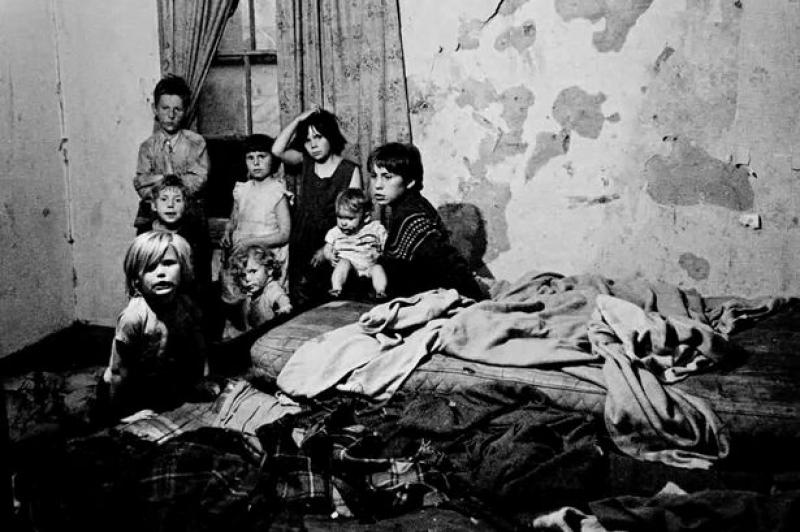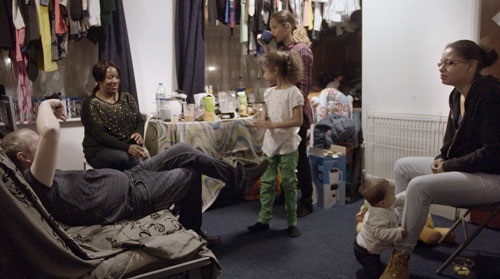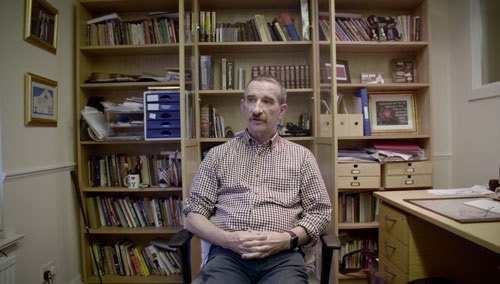Slum Britain: 50 Years On, Channel 5 | reviews, news & interviews
Slum Britain: 50 Years On, Channel 5
Slum Britain: 50 Years On, Channel 5
An unflinching look at the changing face of poverty in Britain

In the late 1960s, photographer Nick Hedge travelled the country, documenting some truly horrific housing conditions and the people who were forced to live in them. He photographed entire families living in one room with no heating or access to running water – people who had almost literally nothing. These weren’t isolated people on the fringes of society, these were communities, for many of those involved, this was normal.
I wouldn’t have bet big money on Channel 5 revisiting some of the children pictured in these slums with care and moving sensitivity, while also highlighting the plight of the modern-day homeless, but Slum Britain: 50 Years On, the result of a partnership with housing charity Shelter (marking its 50th anniversary) and award-winning documentary makers Marcel Mettelsiefen and Stephen Ellis (Children on the Front Line), was full of surprises.
We saw the, now grown up, children, including Paul Pryde, whose family had been living in Moss Side, Manchester, who had a very different take than Hedge on the “horrifying” scenes that the photographer captured, “We never gave it a second thought,” he says, “we were poor, but so was everyone around us.”
That’s not something that can be said for those currently homeless. The Coleman family (pictured above), currently living seven to a room, are one of 12,000 families living in emergency temporary accommodation. If you were to pass teenage daughter Eden on the street, you’d never guess, but that’s because poverty looks different these days. It might even come carrying a smartphone. The Colemans see people all around them who are comparatively thriving, they are cheek-by-jowl with a society they feel isolated from, while simultaneously denied any kind of privacy as they sleep many to a bed.
Not everything has changed, of course: look beyond the make-do plasterboard and cheap duvets, and rats, mice and cockroaches are still day-to-day concerns. The main difference now you can have other people’s luxury piped into your Facebook feed while you listen to their scratching. Poverty is relative, and the internet is there to ram the message home with the full force of corporate capitalism.
While feelings of isolation were shown to be acute, the direct effects were staggering. When you strip away connections and community, when someone feels alone, they have little reason to invest in anything other than escape. The scenes of Martin O’Neill, battered and broken by life, shooting up was desperately uncomfortable to watch, but far more so to live. Still, at least Toby Young would have been pleased at the portrayal of poor people drinking and drugging, as it gives him the part of the picture he craves to confirm his prejudices, allowing him to carry on caring about free schools rather than free school dinners.
Street Pastor Jim McMaster (pictured above), a man whose name and title make him sound like a benevolent Viz character, provided one of the few rays of light, his work and humanity helping those in the deepest need, – “throwing lifelines to people before they die” as he puts it – sums up not just the scope of empathy, but also our fragility.
For most of us, life is demonstrably better than it was 50 years ago. Many of those featured in Nick Hedge’s study pulled themselves out of that situation. For those who fall through the cracks, however, it is much the same. Worse still, what safety net there was is being pulled away by a Draconian administration with a brutal and uncaring agenda. It was a bleak message, but one communicated with care and unflinching honesty.
rating
Explore topics
Share this article
The future of Arts Journalism
You can stop theartsdesk.com closing!
We urgently need financing to survive. Our fundraising drive has thus far raised £49,000 but we need to reach £100,000 or we will be forced to close. Please contribute here: https://gofund.me/c3f6033d
And if you can forward this information to anyone who might assist, we’d be grateful.

Subscribe to theartsdesk.com
Thank you for continuing to read our work on theartsdesk.com. For unlimited access to every article in its entirety, including our archive of more than 15,000 pieces, we're asking for £5 per month or £40 per year. We feel it's a very good deal, and hope you do too.
To take a subscription now simply click here.
And if you're looking for that extra gift for a friend or family member, why not treat them to a theartsdesk.com gift subscription?
more TV
 Alien: Earth, Disney+ review - was this interstellar journey really necessary?
Noah Hawley's lavish sci-fi series brings Ridley Scott's monster back home
Alien: Earth, Disney+ review - was this interstellar journey really necessary?
Noah Hawley's lavish sci-fi series brings Ridley Scott's monster back home
 The Count of Monte Cristo, U&Drama review - silly telly for the silly season
Umpteenth incarnation of the Alexandre Dumas novel is no better than it should be
The Count of Monte Cristo, U&Drama review - silly telly for the silly season
Umpteenth incarnation of the Alexandre Dumas novel is no better than it should be
 The Narrow Road to the Deep North, BBC One review - love, death and hell on the Burma railway
Richard Flanagan's prize-winning novel becomes a gruelling TV series
The Narrow Road to the Deep North, BBC One review - love, death and hell on the Burma railway
Richard Flanagan's prize-winning novel becomes a gruelling TV series
 The Waterfront, Netflix review - fish, drugs and rock'n'roll
Kevin Williamson's Carolinas crime saga makes addictive viewing
The Waterfront, Netflix review - fish, drugs and rock'n'roll
Kevin Williamson's Carolinas crime saga makes addictive viewing
 theartsdesk Q&A: writer and actor Mark Gatiss on 'Bookish'
The multi-talented performer ponders storytelling, crime and retiring to run a bookshop
theartsdesk Q&A: writer and actor Mark Gatiss on 'Bookish'
The multi-talented performer ponders storytelling, crime and retiring to run a bookshop
 Ballard, Prime Video review - there's something rotten in the LAPD
Persuasive dramatisation of Michael Connelly's female detective
Ballard, Prime Video review - there's something rotten in the LAPD
Persuasive dramatisation of Michael Connelly's female detective
 Bookish, U&Alibi review - sleuthing and skulduggery in a bomb-battered London
Mark Gatiss's crime drama mixes period atmosphere with crafty clues
Bookish, U&Alibi review - sleuthing and skulduggery in a bomb-battered London
Mark Gatiss's crime drama mixes period atmosphere with crafty clues
 Too Much, Netflix - a romcom that's oversexed, and over here
Lena Dunham's new series presents an England it's often hard to recognise
Too Much, Netflix - a romcom that's oversexed, and over here
Lena Dunham's new series presents an England it's often hard to recognise
 Insomnia, Channel 5 review - a chronicle of deaths foretold
Sarah Pinborough's psychological thriller is cluttered but compelling
Insomnia, Channel 5 review - a chronicle of deaths foretold
Sarah Pinborough's psychological thriller is cluttered but compelling
 Live Aid at 40: When Rock'n'Roll Took on the World, BBC Two review - how Bob Geldof led pop's battle against Ethiopian famine
When wackily-dressed pop stars banded together to give a little help to the helpless
Live Aid at 40: When Rock'n'Roll Took on the World, BBC Two review - how Bob Geldof led pop's battle against Ethiopian famine
When wackily-dressed pop stars banded together to give a little help to the helpless
 Hill, Sky Documentaries review - how Damon Hill battled his demons
Alex Holmes's film is both documentary and psychological portrait
Hill, Sky Documentaries review - how Damon Hill battled his demons
Alex Holmes's film is both documentary and psychological portrait
 Outrageous, U&Drama review - skilfully-executed depiction of the notorious Mitford sisters
A crack cast, clever script and smart direction serve this story well
Outrageous, U&Drama review - skilfully-executed depiction of the notorious Mitford sisters
A crack cast, clever script and smart direction serve this story well

Add comment